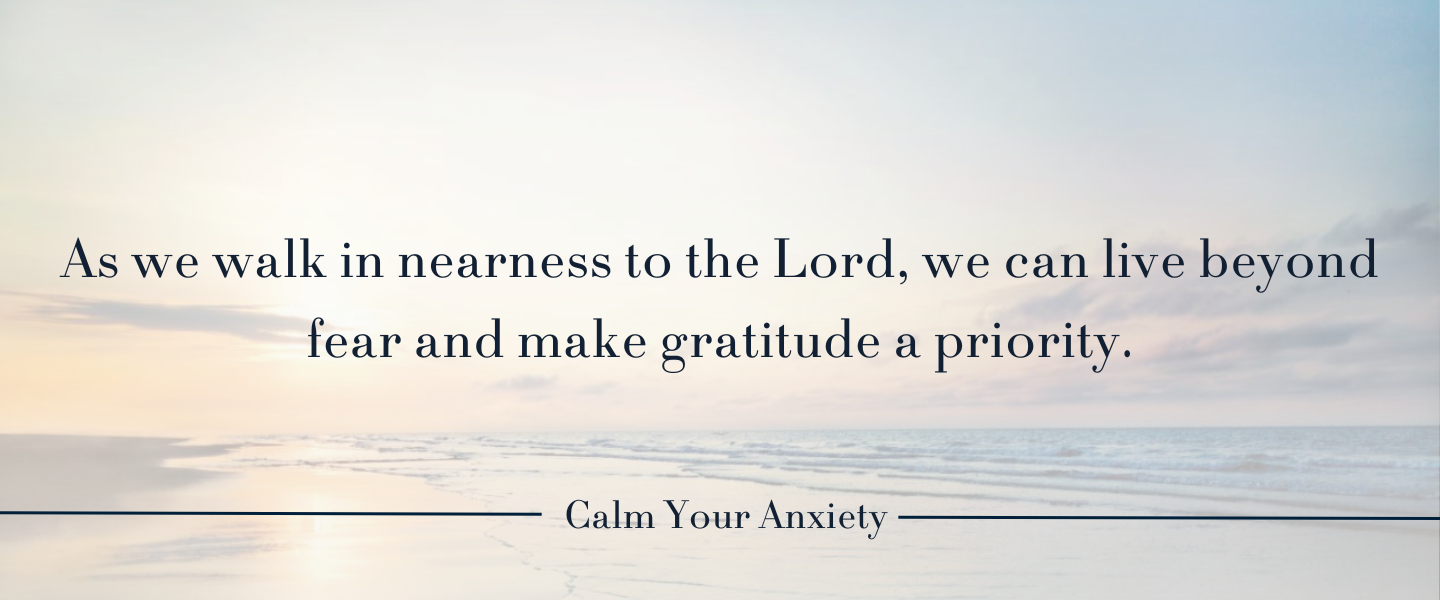Calm Your Anxietyنموونە


The Habits Of Nearness And Gratitude
We can more easily develop a calming, continuing dependence on God by regularly remembering how near He is. How present He is. When you spot a couple walking down the street hand-in-hand, you know they’re in love. The same is true for us in our love for Jesus. We enjoy the Lord’s fellowship when holding His unchanging hand, and as we cultivate a sense of His nearness, we grow increasingly intimate with Him. We’re strengthened and steadied by His presence.
The Lord’s nearness can be understood in two ways. First, He is close beside you right now, so don’t worry; instead pray. He walks beside you every moment, and He longs for His very presence to calm and control you. It’s true that God is everywhere at once, yet in a personal way our Lord draws near and speaks to us in times of stress, worry, anxiety, or fear. When I practice His presence, I’m dealing with reality, and reality fosters peace and a revival of faith in God.
The Lord’s nearness can also be understood as Jesus’ coming return to earth is near. From the vantage of eternity, Jesus has only been gone from earth a couple of days. He understands nearness and slowness from a different frame of reference. The Lord wants us to live with anticipation and readiness, and, from His perspective, we may well be down to the last hours or minutes. If He doesn’t come to us during our lifetimes, we will go to be with Him at the end of our lifetimes, and that could happen at any second. None of us has the promise of tomorrow. When the Lord takes His children out of the world, they’re released from all their problems, and this provides great solace (see Revelation 21:4). The regular contemplation of the Lord’s return and of heaven is an essential biblical therapy for anxiety. As we live in anticipation of Jesus’ near return, we still have fruitful labor for Him here and now—with Him at our side.
As we walk in nearness to the Lord, we can live beyond fear and make gratitude a priority. Gratitude comes when we offer our prayers and requests to God with a posture of thanksgiving. In a world where we’ve been anxious over everything, we need to nurture thankful hearts and minds full of gratitude. No matter our crisis or concern, there are always notable items for which we can be thankful, and finding them is essential to mental health.
You can instantly lessen the level of your anxiety by finding something for which to immediately thank God. It’s like the seesaw we played on as children. When the poundage at one end counterbalances the other, the law of gravity goes into effect. The weight of your blessings is sometimes heavy enough to flip your worries into the air like a bully caught off guard. The ability to say, “Thank You, Lord,” is among the most wonderful things about being a follower of Jesus Christ. We don’t thank and praise God merely to gain the psychological benefits of doing so. We thank and praise Him because He is the God from whom all blessings flow. But this gratitude boomerangs into emotional, psychological, and spiritual benefits—such as the peace and hope of Christ.
Respond
How would you describe the nearness of your walk with Jesus? How can you be more aware of His presence in your life?
How do you respond when you consider the truth that Jesus is returning for you?
What are you grateful for? How does being a follower of Jesus help you be grateful, and how does this gratitude bring you the peace and hope of Christ?
About this Plan

This plan includes five daily readings based on Robert J. Morgan’s book Calm Your Anxiety. The reading plan will explore how to change your life by learning to manage your anxiety through the nurturing of a biblical, close, joyful relationship with God.
More
پلانە پەیوەستەکان

Grateful Hearts

A Pretty Big Deal by Megan Marshman

Five Things to Look for in a Future Husband

Advent Through Exodus: The Miracle of Christmas

Faithful: Leaving a Legacy of Integrity

Your Identity in Christ

Advent Devotional

ChangeMakers: Unsung Women of the Bible (Part 1)

Acts 6:1-7 | the Desperate Need for You
![[Deeply Rooted] Stand Strong](/_next/image?url=https%3A%2F%2Fimageproxy.youversionapi.com%2Fhttps%3A%2F%2Fs3.amazonaws.com%2Fyvplans%2F52679%2F320x180.jpg&w=640&q=75)